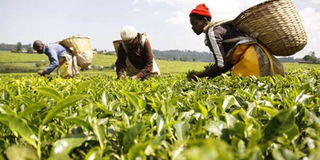Kenyan specialty tea export drops 25pc as petrol prices collapse

Tea pickers at Nandi Tea Estate Limited in Nandi Hills: Kenya earned Sh202 million in the year to June compared to Sh231 realised in the previous financial year. FILE PHOTO | JARED NYATAYA | NATION MEDIA GROUP
What you need to know:
- Kenya earned Sh202 million in the year to June compared to Sh231 realised in the previous financial year.
- There was low demand of tea from Iran, Russia and Kazakhstan which are major buyers of the orthodox tea.
The value of specialty tea sold to the international market from Kenya dropped 12 per cent after a slump in the economies of major buying countries following low oil prices.
Statistics from the Kenya Tea Development Agency (KTDA) indicate Kenya earned Sh202 million in the year to June compared to Sh231 realised in the previous financial year.
General manager for marketing John Bett says there was low demand of tea from Iran, Russia and Kazakhstan which are major buyers of the orthodox tea.
Mr Bett also attributed the decline on Kenya’s fixed price on this type of tea, which is higher than in countries such as Sri-Lanka where the commodity is traded at the auction, making the price a bit lower.
A kilogramme of tea in Sri-Lanka fetches Sh347 compared with Sh474 that it sells at in Kenya.
“Devaluation of currencies resulting from economic slump due to low oil prices in our major markets led to the decline in value of the orthodox tea in the just ended financial year,” said Mr Bett.
Oil prices have been falling since 2014 where it traded at a high of $114 per barrel to the current lows of $47, affecting the countries whose budgets are solely dependent on oil.
The KTDA is banking on orthodox tea to grow its earnings as it seeks to cut reliance on black CTC tea Kenya is renowned for.
Mr Bett said though production of this type of tea is still low, it has a promising future for the earnings of the company and the farmers.
For instance, a kilogramme of black CTC tea sells at an average of Sh300 while the same quantity of orthodox tea attracts more than Sh400.
The tea agency has installed specialty tea processing equipment in Kangaita in Embu, Itumbe in Kisii and Meru.
Additional lines to process the orthodox tea will be rolled out in all the 12 tea zones by the end of next year.
The three factories have a combined production capacity of 2.1 million kilogrammes.
Last year, they produced 427,000 kilogrammes of orthodox tea — a decline from the previous year when output stood at 600,000 kilogrammes.
Mr Bett expressed optimism that the volumes would grow this year, which started on a better note compared to 2014/2015.
Kenya seeks to reach beyond the traditional markets of Egypt, Sudan, Pakistan and Afghanistan that are the major buyers of black tea.
Orthodox tea is made by rolling whole tea leaves into different sizes while the more common CTC teas are made using the crush, tear, curl process to produce granular particles.




